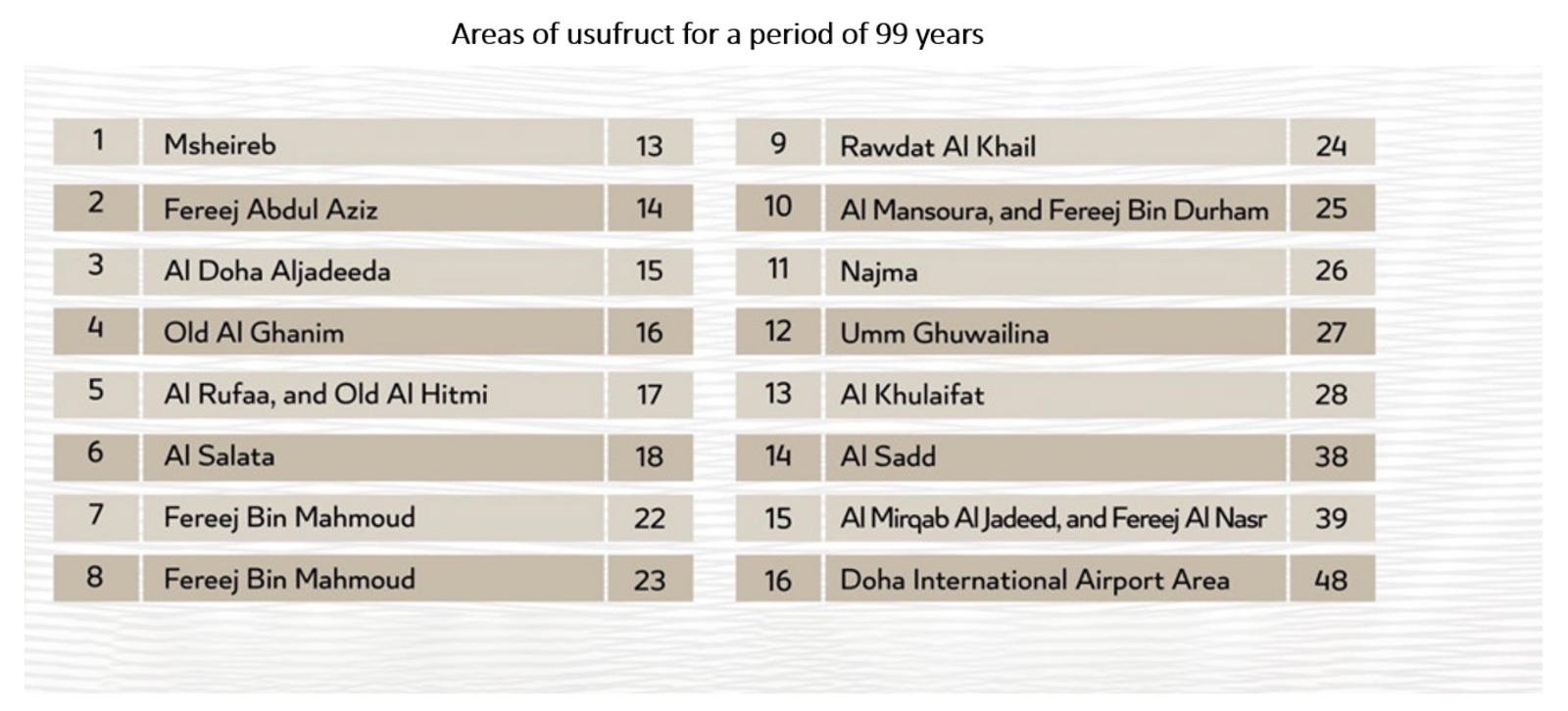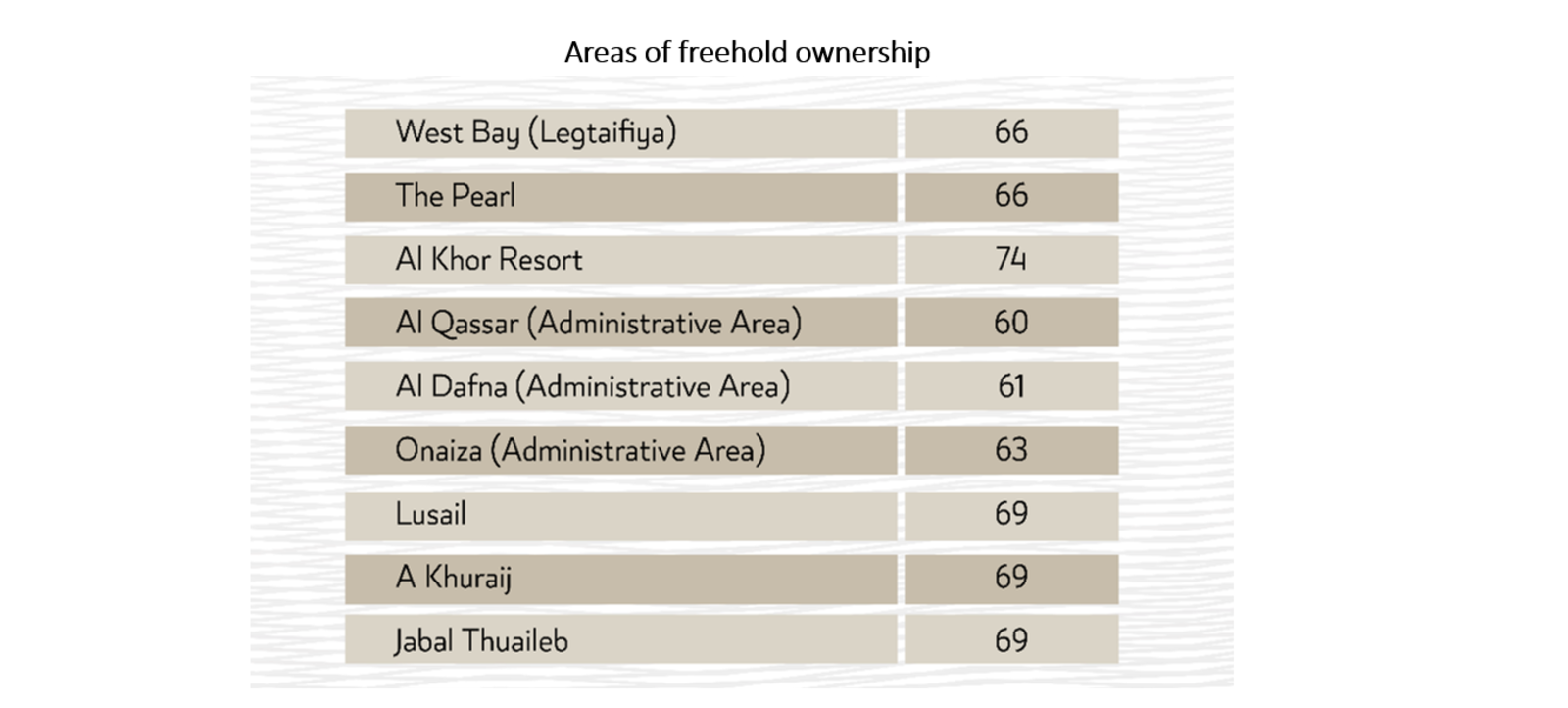How to obtain Qatar residency through real estate ownership
Qatar is a vibrant and prosperous nation in the heart of the Middle East and has become an increasingly attractive destination for expatriates seeking residency in a thriving economic and cultural hub. Qatar offers several residency options for expatriates, and these permits allow non-Qataris to reside in the country on a long-term basis, providing stability and access to various benefits. One avenue to secure residency in Qatar is through real estate ownership. To obtain Qatar residency through real estate ownership, you must meet specific criteria and adhere to the regulations set by the Qatari government.
Decision No. (28) of 2020 by the Council of Ministers outlines the regions where non-Qataris are eligible to own and utilize real estate, along with the stipulated conditions, controls, benefits, and procedures governing their ownership and usage.
The extent of ownership and the use of property in Qatar
Qatar's Decision No. 28 of 2020 outlines the specific sectors where non-Qataris are permitted to own and utilize real estate. The decision outlines the conditions, regulations, benefits, and procedures governing their ownership and usage of real estate, with the aim of promoting the interests of investors and encouraging growth in the country's real estate sector. This ministerial decision creates favorable opportunities for investors to engage in strategic partnerships, allowing them to own and use real estate in 25 strategically designated areas. These areas, integrated into Qatar's recent urban development plan, hold the potential for promising investment returns.
Advantages of ownership and use of the real estates in Qatar
Aside from the clear opportunity to buy property in Qatar and get residency, investors stand to gain from the advantages associated with the ownership and utilisation rights extended to non-Qataris. Qatar’s current legal and legislative systems include:
- Permitting non-Qatari companies to own properties in the areas specified by the Council of Ministers Decision.
- Allowing real estate investment funds, whether locally established or foreign, to engage in investments within the real estate sector.
- Providing residency to real estate owners without sponsorship, provided the current property value is not less than USD200,000 USD, approximately QAR730,000.
- Offering permanent residency benefits, including access to health and education in government institutions, as well as opportunities to invest in sectors of the national economy, to real estate owners whose current property value is not less than USD1,000,000, approximately QAR3,650,000.
- Ensuring the continuity of usufruct rights granted to non-Qataris, which persist beyond the death of the usufructuary and are subsequently transferred to the heirs.
What are areas in which non-Qataris are allowed to invest?
Non-Qataris are permitted to invest in various real estate categories, including land, residential units, villas, detached units within residential complexes, offices, shops in commercial malls, as well as buildings and establishments.


What are the steps for obtaining real estate in Qatar?
- Select the desired real estate for purchase and, if applicable, seek guidance from the local real estate developer.
- Complete the application for non-Qatari ownership of the real estate through the online portal on the Ministry of Justice website and await approval.
- Finalise the buying and selling procedures and collect the title deed at the designated office for non-Qatari real estate ownership.
- If necessary, visit the Ministry of Interior to obtain the residency permit.
Note: Non-Qataris are permitted to own standalone residential units within residential complexes. Additionally, they have the authorisation to own detached units such as offices and shops within commercial complexes and malls in areas not specified in the preceding paragraph. It is imperative that owners refrain from altering or modifying the unit's nature, shape, or appearance. This allowance is contingent upon adherence to the specified conditions outlined in this Resolution and Law No. (4) of 1985.
What is the Law of Real Estate Ownership System in Qatar (Freehold -99 Years Ownership)?
This law governs and outlines the conditions and regulations for obtaining usufruct rights over real estate in Qatar. The term "99 years Ownership" implies that the owner has the authority to manage and lease the real estate. Freehold, on the other hand, denotes ownership of real estate in designated areas of Qatar as specified by a decision of the Council of Ministers, with foreigners permitted to hold bare ownership and usufruct rights. Law No. (16) of 2018, which regulates the ownership and use of real estate by non-Qataris includes provisions granting licenses to non-Qataris for real estate ownership and usage in specified areas, subject to conditions, controls, benefits, and procedures determined by a resolution of the Council of Ministers.
What is the authority concerned with regulating non-Qatari ownership and the use of real estate?
The concerned authority is the "Committee for Regulating Non-Qatari Ownership and Use of Real Estate", in accordance with Law No. (16) of 2018 on Regulating non-Qatari Ownership and Use of Real Estate.
What are the parameters for non-Qatari property owners and beneficiaries?
They have the complete authority to manage the real estate, including selling, renting, and investing. It should be noted that in the case of land, there is a requirement that they can only exercise disposal rights by developing or constructing on it within a specified four-year period.
If the real estate is on vacant land, what is the timeframe within which the owner must finalize construction?
In the case of vacant land, the owner is required to commence construction within four years from the date of registering the land under their name.
Is it permissible for the owner of the real estate to appeal against the decision of the Committee in case the construction is not completed, and the Committee disposes of the land?
A complaint may be made to the Minister of Justice within (30) days from the date on which the concerned person becomes aware of the Committee's decision.
What happens to the property in the event of a dispute between the developer and the owner?
The property would then be returned to the Qatari courts.
What are the authorities who handle requests for ownership and use of property in Qatar?
The offices of non-Qatari real estate ownership are located in the Pearl area and Lusail City.
How many properties can a foreigner own in Qatar?
There is no set limit for real estate situated in freehold areas, and individuals are allowed to own one residential unit within residential compounds, which are outside the specified freehold areas.
Could a non-Qatari own real estate through their inheritance?
In the event that a non-Qatari inherits or acquires property through a will in areas not outlined in Table 1 of the designated freehold areas for non-Qataris, there is a requirement to divest the property to a Qatari individual through any applicable method of ownership transfer within two years from the date of the ownership transfer. However, as an exception, a non-Qatari may maintain ownership of one designated residential real estate from the inherited or willed properties in areas not specified in the table. This exception is subject to the condition that the real estate's area does not exceed three thousand (3000) square meters and that the individual's residency in the state remains continuous.
Are Qatar investments tax-free?
You will not pay property tax in Qatar. However, registration charges will be charged for property purchases and capital gains will be charged when selling property in Qatar.
What are the benefits from owning property in Qatar?

Note: If an individual owns a property or multiple properties collectively valued at QAR3,650,000, they are entitled to all the privileges outlined in Article 7, Paragraph 2 of Council of Minister's Resolution No. 28 of 2020, pertaining to the regulation of non-Qatari ownership and use of real estate. These benefits encompass those extended to holders of permanent residence cards, such as access to healthcare, education, and opportunities for investment in select economic activities. This essentially provides the benefits of Qatar permanent residency by investment, contingent on the condition that they maintain a minimum annual residency of 90 days in Qatar, whether continuously or intermittently.
In the case where the property holds a value of at least QAR730,000, the owner is eligible to secure a residency permit without requiring a sponsor, essentially enabling Qatar residency by investment. This provision applies as long as the individual maintains a minimum annual residency of 90 days in Qatar, whether continuously or intermittently.
Both ultimately resulting in obtaining a Qatar residence permit by investment in property.
What documents will be required?
- Passport copy
- Police clearance certificate (PCC) attested by Qatar embassy in the origin country of the investor.
- Title deed certificate
How can PRO Partner Group help?
Acquiring Qatar residency by buying property is an exciting opportunity for individuals looking to establish a long-term presence in this dynamic and thriving nation. By understanding the requirements, following the necessary steps, and seeking professional guidance, it is possible to obtain residency and the resulting benefits. It is important to keep in mind that regulations may evolve, so it's essential to stay informed and up-to-date throughout the application process.
PRO Partner Group has in-depth knowledge of the Qatar real estate market and close connections with government departments and freezone authorities. We can assist with how to get residency in Qatar through real estate ownership by providing expert guidance and ensuring compliance with legal requirements. We will streamline the process, making it as efficient and seamless as possible.
If you need assistance with Qatar residency through real estate ownership or any other related onshore or offshore company setup, restructuring, local partner or PRO support matter in Qatar, Abu Dhabi, Dubai, the wider UAE, Oman, or KSA, then please do get in touch with us on +974 (0)44 788 765 for Qatar or, +971 (0)4 456 1761 for Dubai, email us at info@propartnergroup.com or complete the contact form below and we will be delighted to assist you.
















































